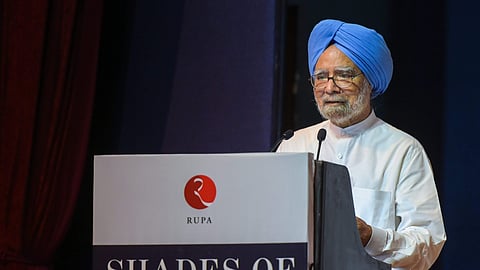

Dr Manmohan Singh belongs to an era when politicians were respected for allowing institutions to flourish. It is not as if there were no aberrations in the past. By and large, the spirit of the Constitution was honoured by those in power. Even when Atal Bihari Vajpayee was the Prime Minister (1999-2004), he respected and heard the voice of the opposition.
Narasimha Rao, on one occasion, requested Vajpayee, who was the Leader of Opposition at the time, to lead a delegation to the UN. It was during those years that Manmohan Singh, from being a bureaucrat, who served the nation in several capacities, became the Prime Minister in 2004.
The opening up of the Indian economy, when a radical shift was made in 1991, by Singh as Finance Minister with India’s balance of payments in deep crisis. His economic liberalisation policy paved the way for what India is today. Every sector of the economy moved away from the license quota raj and from a 3.3% growth rate prior to 1991, we in the 1990s witnessing India’s GDP growing at 6%. Between 2004 and 2014, GDP growth averaged 7.7% with 8.1% average growth between 2004 and 2009.
Those were golden years, when India’s growth story was lauded internationally and 271 million people moved above the poverty line. Economic growth during these years was tempered with equity. Singh believed that growth without equity, is not the path India should tread.
His commitment to Parliament and Parliamentary institutions was unmatched. He sat through the debates, listening to the opposition and attempted, to the extent possible, to move forward with consensus. He did not have the luxury of a brute majority in the Lok Sabha and therefore, had to navigate his policies through dialogue both with his coalition partners and the opposition. The dialogues, with his coalition partners, allowed him to make some monumental decisions.
The Right to Information Act, 2005, brought about enormous transparency in the process of decision making. With information available to citizens, government could be held accountable, making transparency a policy prescription. The Right to Free and Compulsory Education Act, 2009, allowed 25% of children belonging to the poor and marginalised communities to be admitted to private schools where their education was subsidised from Class I to Class VIII. These changes in many senses recognised that unless people at the bottom of the pyramid have opportunities, India will continue to be an iniquitous society.
‘His tenure to be etched in history in golden letters’
Constitutional reforms allowing reservations in promotion posts and educational institutions for the Scheduled Castes and Scheduled Tribes and the backward communities were reforms that catered to the needs of the less privileged. The constitutional amendments in 1995 and then in 2000 allowed for reservation of SCs and STs in promotional posts and reservations in filling backlog vacancies, respectively. Having come from a humble background, uprooted during Partition and starting his career as a teacher, he understood the concerns of the common man, concerns central to his policy prescriptions either during his tenure as a bureaucrat or when he was PM.
On the economic front, through his policies as Finance Minister during Narasimha Rao’s regime, he opened up several sectors. He got rid of the license raj, reduced tariffs and import restrictions, encouraged foreign direct investment in most sectors and signaled an opportunity for the private sector to enter markets thus far reserved for the public sector. The technology revolution that we are seeing today in the IT and the telecommunications sector was signally responsible for the growth rates which were achieved during UPA I and II.
Reforms in the IT sector along with investments from abroad allowed it to grow exponentially. The services sector, because of these far reaching economic reforms, today contributes around 55% to the GDP of this country; thanks to the software revolution that took place. These reforms also brought about a boom in the stock market, which continues till date.
Manmohan Singh was a man of few words. His capacity to listen and absorb was unmatched. His perspicacious comments in the course of any conversation reflected a razor sharp mind full of wisdom. His decision to craft the Indo-US nuclear deal was a high point in his tenure as PM with the Left parties and other coalition partners included in the committee which was set up to scrutinise details of that deal. This proved to be a difficult process, with the Left parties withdrawing support. However, he stood firm and with the help of Samajwadi Party sealed the deal. The result was India’s arrival as a nuclear power, with its concomitant benefits.
During his tenure, his approach in matters relating to foreign affairs brought the neighbourhood in South Asia close to India. On Pakistan, he was firm that unless it eschews terrorism as a political weapon to de-stabilise India, he will not negotiate with them. Thus he never went to Pakistan during his tenure as PM. His relationship with European powers, in particular Germany and France, his dealings with the US and Russia along with Japan and China reflected maturity.
All his decisions were tempered with caution, keeping domestic politics in mind. His quiet demeanour and firm resolve earned him the respect of the leaders around the world. Even though frequent negotiations with the Chinese to resolve our border issues did not result in any real outcome, yet the relationship was not as volatile as it is now.
Manmohan Singh will be remembered as a simple, thoughtful, humble human being. His tenure will be etched in India’s history in golden letters.
Kapil Sibal
Member of Rajya Sabha